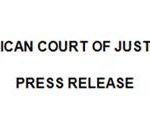
*********************************
East African Community Headquarters, Arusha, Tanzania, 27th April, 2020: EAC Partner States have been urged to treat truck drivers and crew who test positive for COVID-19 in the host Partner State rather than deporting them to the country of origin as this will result in further spread of the disease.
Through a 17-page document titled ‘EAC Administrative Guidelines to Facilitate Movement of Goods and Services During the COVID-19 Pandemic’ sent to Partner States, the Secretariat calls on Partner States to enforce mandatory screening or testing of truck drivers and crew at border posts and undertake mobile monitoring during transit at selected inland points.
Partner States have been further advised to quarantine those with symptoms for 14 days under the supervision of the respective Ministry of Health.
To facilitate cross-border trade during the ongoing crisis occasioned by the novel coronavirus, Partner States have been called upon to, among other things: adopt an multi-sectoral and coordinated approach; provide access at all designated points for entry and exit of goods; treat cross-border movement of trucks and cargo as essential services.
Among the items that are supposed to be prioritized as essential goods to mitigate the COVID-19 pandemic are food, fuel, medicaments, agricultural products and inputs, security supplies, emergency and humanitarian relief goods.
To mitigate critical shortages of equipment and supplies, Partner States have been called upon to promote local production of the items required to contain COVID-19, for example, medicaments, sanitizers, protective gear and ventilators.
Partner States have further been advised to support the Micro, Small and Medium Enterprises (MSMEs) sector which employ many East Africans by exploring avenues to enable MSMEs to remain in business and expand as a foundation for post-COVID-19 recovery process.
Transporters and Transporters’ Associations have been directed to adhere to the requirement of having only two (2) to three (3) operators of the truck including the driver.
In a letter addressed to EAC Permanent/Principal/Under Secretaries in the Partner States’ Ministries responsible for EAC Affairs and copied to their counterparts in the Ministries of Trade and Health, the EAC Deputy Secretary General in charge of the Productive and Social Sectors, Hon. Christophe Bazivamo, on behalf of the Secretary General, states that administrative guidelines had been developed by the EAC Adhoc Regional Coordination Committee on COVID-19 response.
On payments and communication services, Partner States may waive fees on port/border handling charges for essential goods during this period.
“Partner States to facilitate the use of electronic payments, such as mobile money to significantly reduce the use of cash to curb the spread of COVID-19,” avers the policy document, which further calls on service providers such as banks and telecommunications companies to lower transaction costs on money transfer, data and roaming charges.
On the exchange and sharing of information, Partner States are urged to continuously share information on the COVID-19 pandemic with each other and with the EAC Secretariat.
“Government agencies, traders and cargo handlers are urged to share information on challenges encountered in the movement of goods and services during this period of COVID-19 pandemic to facilitate timely response,” it says, adding that Partner States and the Secretariat should designate offices which will facilitate the exchange and sharing of information.
NOTES TO EDITORS:
The EAC has introduced the COVID-19 Administrative Guidelines purposely for application during the COVID-19 pandemic period. The Objectives of the Administrative Guidelines are: to complement national measures against the COVID-19 pandemic; to ensure smooth and uninterrupted movement of goods and services during the COVID-19 pandemic; to encourage local production of essential products during this COVID-19 pandemic; to enhance regional awareness on measures instituted against the COVID-19 pandemic, and; to mitigate the negative impact of COVID-19 on the free movement of goods and services.





